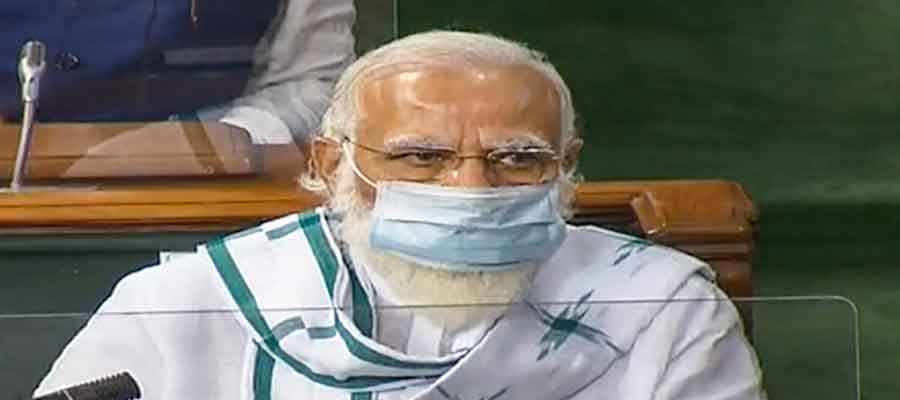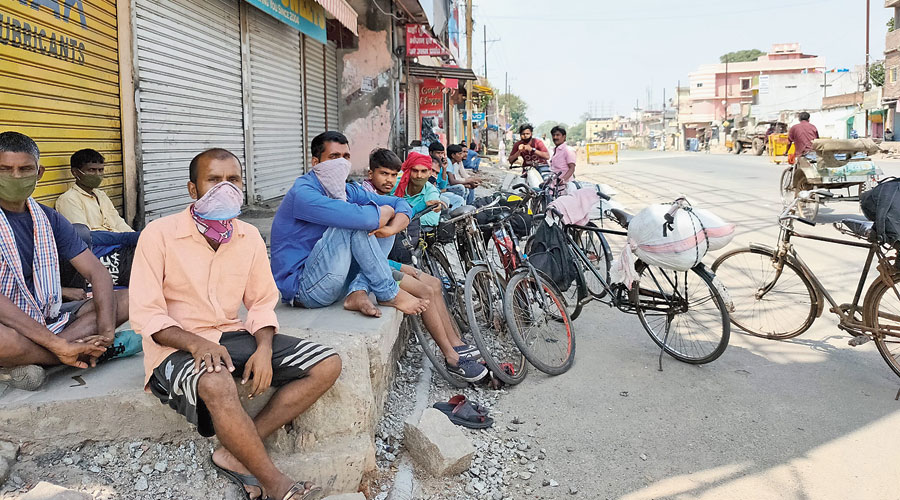Parliament passed three bills on Wednesday to usher in a labour regime that promises employers a less stressful hiring environment that can be tailored to business cycles and increases the size of units that can exit when conditions turn adverse.
While trade unions and some economists warned of deeper uncertainty and anxiety on factory floors, large sections of industry celebrated the passage of the bills as a milestone in labour reforms.
The Rajya Sabha passed the Occupational Safety, Health and Working Conditions Code, Social Security Code and the Industrial Relations (IR) Code a day after the Lok Sabha had cleared them on Tuesday.
These laws will replace 25 existing labour laws — some of them put in place by the Raj – essentially telescoping the multiplicity of state and central laws dealing with protection of worker rights and privileges.
A section of labour economists say the provisions will boost fixed-term contract employment without protections and weaken workers’ power of collective bargaining, while bringing some benefit to formal-sector workers since appointment letters have been made mandatory.
Trade unions, including the RSS-affiliated Bharatiya Mazdoor Sangh, expressed concern at several provisions that they felt restricted trade unions’ ability to negotiate with management or organise strikes.
Industry seemed to be chuffed by the changes proposed, and Prime Minister Narendra Modi held aloft the passed bills as “shining examples of minimum government, maximum governance”. Modi added that the reforms would “ensure the well-being of our industrious workers and give a boost to economic growth”.
Although industry leaders used terms like “big-bang” reforms to fete the bills, few were prepared to say whether investors would flock to the states that grant exemptions from provisions of the Industrial Relations Code which legalises a fixed-term employment contract. The expected short-term labour arrangement takes into account the “gig economy” which is characterised by contracts for brief periods and freelance work.
States like Rajasthan and Madhya Pradesh which had introduced some labour reforms a couple of years ago have not yet experienced a spurt in industrial investment — and it’s hard to say whether there will be an immediate surge in private investment in a post-Covid environment.
The big relief that industry is truly pleased about is the lowering of the exit barrier for firms. Under the Industrial Relations Code, establishments hiring 100 or more workers needed government permission for closure or layoffs. The new code has raised this to 300, which means a number of small and medium firms will be able to shut shop at will if the business starts to flounder.
Chandrajit Banerjee, director-general of the Confederation of Indian Industry (CII), termed the new labour code as the “big-bang structural reforms” that would improve the climate for both workers and industry by resetting “the entire regulatory framework... and providing enterprises with flexibility, transparency and clarity”.
Both Banerjee and Deepak Sood, secretary-general of Assocham, were gung-ho over the fact that the new labour reforms had been extended to the gig economy.
“The new labour laws will be easy to implement and will provide better social security to the workers including those employed in the emerging gig economy,” said Sood who felt that it would send out a positive signal to global enterprises looking to relocate their businesses to India.
Rohit Relan, President of the All India Organisation of Employers’, an allied body of Ficci, said it was a historic day for the country as the reforms would bring “India’s large informal sector employees into formal workforce”.
“Business is uncertain. Investors need flexibility. When the going is good, you may need people but when the business is doing bad, you should have the option to align the workforce accordingly,” Rajiv Singh, director-general of the Indian Chamber of Commerce (ICC), said.
“Last time round, the companies that were looking to expand outside China mostly went to Vietnam, which provided flexibility in labour terms. As a country, we should not miss such an opportunity again,” he added.
Some of the features of the three new bills:
Fixed-term jobs
The IR Code gives legal backing to the expression “fixed-term employment” or FTE, which refers to establishments appointing employees for a fixed, limited period without any obligation stretching beyond that period.
FTE is similar to the contractual appointments in the formal sector that the existing laws allow, but economists said the durations are likely to be shorter in practice. The shorter durations reflect the practice in the gig economy.
Bharatiya Mazdoor Sangh general secretary Virjesh Upadhyay said in a media statement that FTE would pave the way for the “casualisation” of the workforce.
“Casualisation and contractualisation is going to create explosive situation in the near future. It will also lead to below-quality productive activities in industrial sector and create an India of casualised labour,” he said.
Shyam Sundar, professor of human resource management at XLRI, Xavier School of Management, Jamshedpur, underlined that the government had through an executive order allowed FTE a couple of years ago.
“Under FTE, the employee may be appointed for six months or one year. After the expiry of the period, employment will be terminated without any notice or compensation,” another labour economist, Amitabh Kundu, said. “The company will not be obliged to cite any reason for terminating the services.”
Bargaining blow
The IR Code introduces a stringent recognition criterion that trade unions must meet to be able to bargain with the management.
While retaining the existing provision for registration -— that a union should have the support of 10 per cent of the workers or 100 workers, whichever is less — it says a union will need the support of 51 per cent workers to be recognised and be allowed to negotiate.
The existing central laws have no provision of recognition for the unions. A few states did have such a provision but it was less stringent, labour economists said.
Earlier, more than one union could negotiate with management but Citu secretary A.R. Sindhu said only one would be able to do so under the new code.
“The code says 51 per cent support is a requirement for negotiation. If the remaining 49 per cent workers have a different view, they will have no say. This is unfair,” Sindhu said.
The existing law allowed employees to go on strike 14 days after issuing a notice but the IR Code prohibits any strikes during the two-month “conciliation process” starting from the date of notice. Nor can strikes be held if the matter goes to a tribunal - a new restriction.
“The workers’ ability to strike, and therefore their collective bargaining strength, seems to have been weakened,” Kundu said.
“The bills will usher in a deregulated labour market with an informal, precarious and insecure workplace where the employer will enjoy unbridled labour market power over the highly disadvantaged workers,” Sundar said.
Appointment letters
Unlike the existing laws, the occupational safety code requires employers to issue appointment letters to every employee, a provision both Kundu and Sundar praised as progressive. Kundu said this would empower the individual worker.
Migrants’ benefits
The occupation safety code mandates a national helpline for inter-state migrant workers -— whose sufferings during the lockdown attracted national attention -—- and an annual travel allowance from the employer to visit their place of origin.
Sindhu was unhappy that the registration of inter-state migrant workers on a national portal has been left to the workers themselves instead of the government installing a mechanism to make sure every migrant gets registered.
Establishments recruiting 10 or more inter-state migrant workers are, however, required to take the initiative to get them registered.
Registered inter-state workers will get subsidised food from designated ration shops at the place where they work. The One Nation One Ration scheme is expected to be launched in March 2021.
Kundu highlighted that for inter-state migrant workers, the code provides for access to health apart from educational facilities for their children.
“Industries, however, can try to escape these requirements by showing the inter-state migrants as intra-state migrants,” he said.
“The bill could provide for welfare measures for intra-state migrants too, as there are more of them.”
Labour minister Santosh Gangwar described the new labour regime as a “historic” game changer that would be a “milestone” for the welfare of workers.
The major Opposition parties, protesting the manner of the farm bills’ passage on Sunday, were absent from Parliament on Wednesday as the labour bills were discussed and passed by voice vote.












